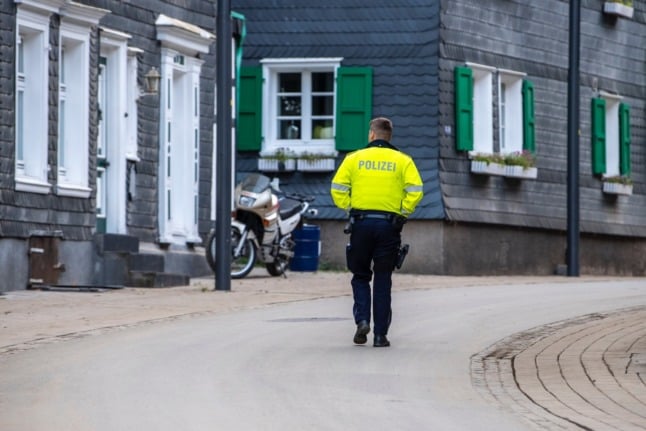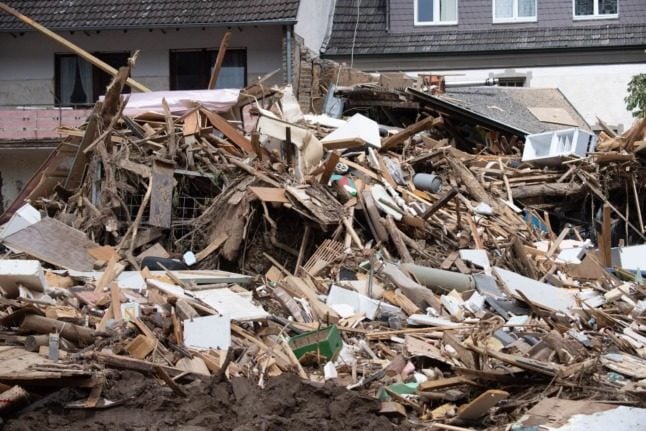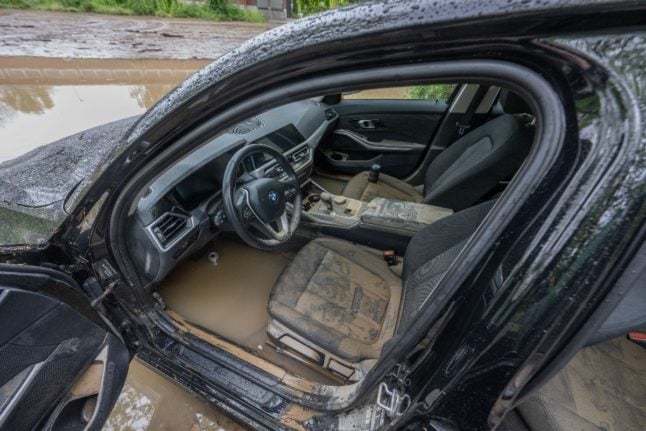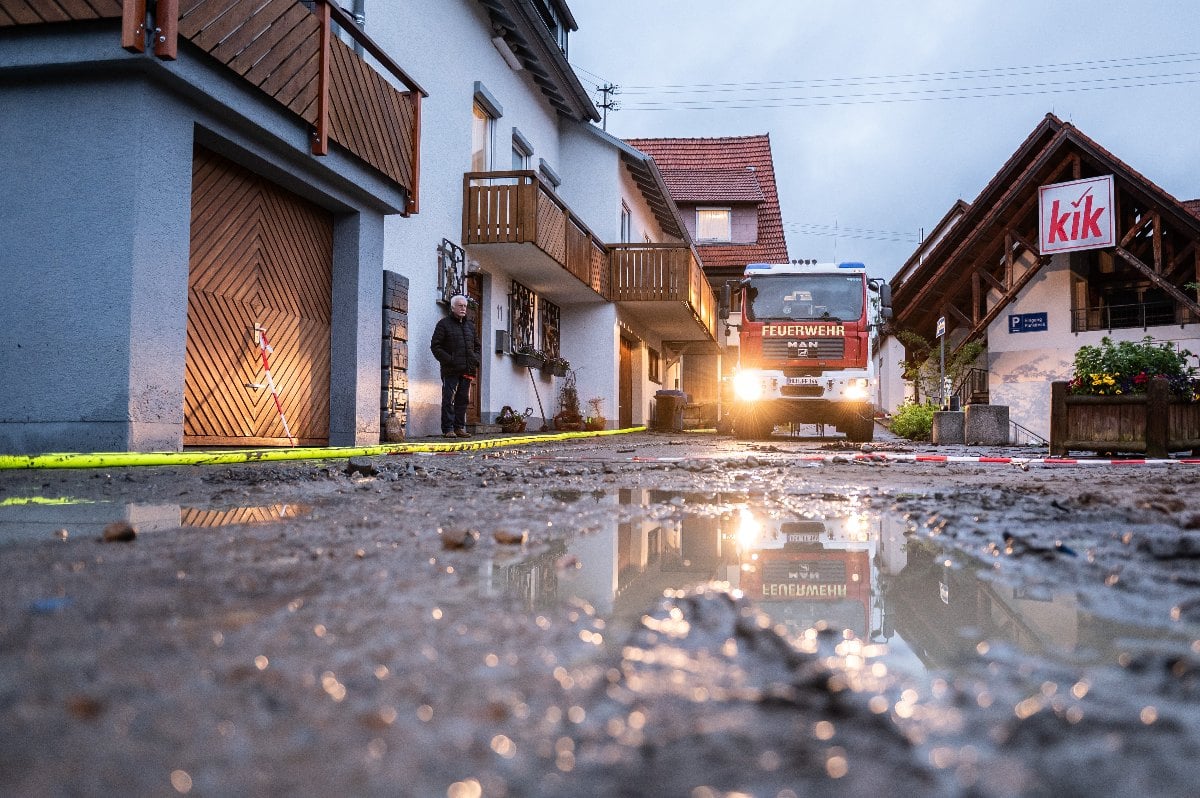The clean-up and search for victims is continuing after the devastating storm disaster in western Germany that has resulted in more than 160 people losing their lives.
After continuous rainfall led to flash floods and rivers breaking their banks on Wednesday night, dozens of residents drowned in their homes before they were able to get to safety.
Regions in Rhineland-Palatinate and North Rhine-Westphalia (NRW) have been worst hit by the catastrophe. Other parts of western Europe, including Belgium, have also been affecting by the flooding.
READ ALSO: Germany’s Merkel sees ‘surreal’ wreckage as Europe flood death tolls top 180
Now the debate over what went wrong and what the country can do better is underway.
“When it comes to disaster protection, we are just as ill-prepared as when it comes to pandemic protection,” the SPD’s Karl Lauterbach told the Rheinische Post.
Economics Minister Peter Altmaier also called for a review of possible mistakes in Germany’s disaster protection.
Dis something go badly wrong?
Forecasters had put parts of Germany on the highest possible alert last week for torrential rain and flash floods. But most people were caught off-guard by the rising waters that swept homes, roads and bridges away, signalling that there could have been a communication failure.
Rescue teams have been painstakingly going through the debris left in destroyed areas, often finding more bodies.
“For so many people to die in floods in Europe in 2021 represents a monumental failure of the system,” Hannah Cloke, a professor of hydrology who set up and now advises the European Flood Awareness System, told Politico.
She added: “Forecasters could see this heavy rain coming and issued alerts early in the week, and yet the warnings were not taken seriously enough and preparations were inadequate.”
Cloke said warnings and messages to evacuate or find in shelter on high ground did not get through to enough people.
Local areas in Germany are responsible for preparing protection, and warning citizens about possible weather dangers.
READ ALSO: Why have the floods in Europe been so deadly?
“There should not have been so many deaths from this event,” Dr Linda Speight, a hydrometeorologist at the University of Reading in Britain, told the New York Times. She also said poor communication about the high risk of flooding had probably contributed to the significant loss of life.
“People were still in their houses when the water came,” Speight said, adding: “and there was no need for that to happen.”
Better disaster protection?
German Economy Minister Altmaier said in a Bild broadcast on Sunday evening that the country needs to clarify whether sufficient precautions were taken.
“It must, as soon as we have provided immediate assistance, also be looked at: are there things that did not go well, are there things that went wrong?” the CDU politician explained. “It’s not about assigning blame, it’s about making improvements for the future.”
The SPD’s Lauterbach said Germany must “adjust and prepare for the fact that there will be more natural disasters in the future, and also regular pandemics”.
The infrastructure has to be created and expanded for this, he explained, adding: “Disaster management is of central importance here.”
Green Party candidate for chancellor Annalena Baerbock, who visited flood sites in western regions, told Der Spiegel: “We need to reshape disaster management, and the federal government needs to take more responsibility for it.”

Emergency situations such as the flood or forest fires are becoming more frequent and can break out in many places at the same time, she said.
“Help only works if everything comes together,” Baerbock said. “For this, there needs to be an authority that bundles all forces, that pulls together helicopters or special equipment from all over Germany or neighbouring EU countries as quickly as possible.”
READ ALSO: How the extreme flooding in Germany is linked to global warming
Baerbock spoke out against centralisation of disaster control in Germany, but in extreme situations coordination has to become faster, she said.
“To this end, the Federal Office for Civil Protection and Disaster Assistance must be equipped with a central office function, as we know it in police work from the Federal Criminal Police Office.”
Furthermore, Baerbock called for “concrete risk and climate adaptation plans” for all municipalities. As examples, she cited the reconstruction of sewage systems or the digital monitoring of water levels in streams.
Chancellor Angela Merkel, who visited the flood zone in Rhineland-Palatinate on Sunday, said lessons should be learnt but cautioned against overly high expectations.
“Of course we ask ourselves what can be done better?” she said. “But in some situations things happen so quickly that you can’t fully escape the force of nature.”
READ ALSO: ‘We have to keep going’ German spa towns begins clean-up after flooding
Were residents warned properly?
The focus is on providing emergency aid for people right now. But German authorities are trying to piece together the events that led to this catastrophe.
According to the North Rhine-Westphalia interior ministry, the extreme flooding did not come as a surprise.
Official warnings of severe thunderstorms had materialised last Monday at around 10.30am, Bild reported on Sunday, citing the ministry. All official warnings had been delivered to the control centres of the districts and the cities.
Due to the severe weather, a “state situation” was set up on Tuesday. This was intended to identify at an early stage whether local assistance was needed in an area.
The head of the Federal Office of Civil Protection and Disaster Assistance (BKK), Armin Schuster, said the warning system had worked – but that the weather in this case was too severe to predict.
“Our warning infrastructure has worked,” Schuster told broadcaster ZDF on Sunday.
“The German Weather Service (DWD) warned relatively well.” The problem, he said, is that it is often impossible to tell half an hour beforehand which place it will hit and with what amount of rain.
READ ALSO: Germany questions warning system after flood catastrophe
Warning apps were used to send out alerts to residents, he said. He couldn’t say where sirens went off in the flood areas affected.
What can be done in future?
Reinhard Sager, president of the German County Council association, also spoke out against centralising disaster control.
“We should not take this extraordinary event as an opportunity to fundamentally question the system of disaster control or to call for a shift of operational powers from the districts and cities to the federal government,” Sager said.
“Against such lightning-fast forces of nature, humans are simply powerless after a certain point,” he said. “We should realise that and accept it.”
A big cleanup operation is underway in the areas affected by the floods. All these tractors and trucks belong to volunteers, people from all over the region who came here to help. They say authorities haven’t shown up and are not coordinating the operation #Hochwasserkatastrophe pic.twitter.com/LColTdJTrO
— Giulia Saudelli (@giuliasaudelli) July 17, 2021
However, Sager did advocate improving warning alerts. “The existing technical possibilities are currently underused,” he said.
North Rhine-Westphalia’s interior minister Herbert Reul (CDU) also opposed reforming disaster response at the federal level.
But Reul said: “Not everything has worked one hundred percent.” But according to his current knowledge, there had been “no major fundamental problems”.
Reul also spoke out in favour of improving the warning systems. For instance, he said, the question is how to reach those people who do not have a warning app.
According to the Rheinische Post, only 8.8 million users nationwide have installed the warning app called Nina from the Federal Office of Civil Protection and Disaster Assistance.
The focus in Germany will now be on how authorities can communicate the severity of weather alerts to residents.




 Please whitelist us to continue reading.
Please whitelist us to continue reading.
Again and again these politicians fail in their duties to the public (who pay their salaries) and are not held accountable. All they have to do is apologize and they are let off the hook. How can it be up to individuals when they do not receive the warning their taxes have paid for? It is a public disgrace which will again allow suitably sad-faced (obviously not Laschet) politicians to promise more in the future and do nothing!